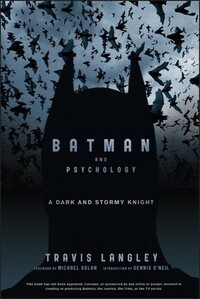Take a photo of a barcode or cover
Batman and Psychology states several times that Batman and his universe are fiction, yet the premise of the book is to help the reader understand how 'real world' psychology would fit into his narrative. Langley goes into detail to explain the psychological make-up of most of the main characters from the Batman franchise, and cover many of the topics which made them heroes or villains.
How does the treatment methods at Arkham Asylum contribute to crime in Gotham City? Is Batman the real man, and Bruce Wayne the costume? Would the Joker be tried as criminally insane in the real world court system? All of these questions are asked and given answers at length in the book, along with direct quotations from the various comic books and films to support it.
By breaking down the psychology of each character and applying their thoughts to the real world, the reader is given a fictional example to help better understand psychological concepts, including ailments recognized in the DSM. In some ways, it doesn't allow any of Batman's rogues gallery to be dismissed as "crazy," but rather explains what possible issues which may have motivated their criminal activity.
This is a psychology book more than a Batman book. If you're someone that loves the Batman comics, then consider this a very deep dive into the Batman lore. "Batman and Psychology" is a systematic break-down of your favorite character, not a fast paced read. The information it provides is incredible, but only if the reader is open to the idea of a thought experiment which involves looking at the Batman universe as a study of a reality similar to our own, but also completely fiction. This is a heavy read for someone looking to escape with a Batman story, but it's something worth curling up with on a 'dark and stormy knight'.
How does the treatment methods at Arkham Asylum contribute to crime in Gotham City? Is Batman the real man, and Bruce Wayne the costume? Would the Joker be tried as criminally insane in the real world court system? All of these questions are asked and given answers at length in the book, along with direct quotations from the various comic books and films to support it.
By breaking down the psychology of each character and applying their thoughts to the real world, the reader is given a fictional example to help better understand psychological concepts, including ailments recognized in the DSM. In some ways, it doesn't allow any of Batman's rogues gallery to be dismissed as "crazy," but rather explains what possible issues which may have motivated their criminal activity.
This is a psychology book more than a Batman book. If you're someone that loves the Batman comics, then consider this a very deep dive into the Batman lore. "Batman and Psychology" is a systematic break-down of your favorite character, not a fast paced read. The information it provides is incredible, but only if the reader is open to the idea of a thought experiment which involves looking at the Batman universe as a study of a reality similar to our own, but also completely fiction. This is a heavy read for someone looking to escape with a Batman story, but it's something worth curling up with on a 'dark and stormy knight'.
2.5 but I just couldn't bring myself to mark it as a 2
It's not that the book was bad, it's just that it didn't really engage me. I don't fault that on the author or the material. Honestly, after reading this book I'd much rather read a book on the psychology of the joker. It's got interesting conclusions about Batman, from everything to Why he prefers to date bad girls (Selina Kyle, Talia Al Ghul), to Why he partners with Children, but I just don't feel like I have any further insight other than "Well that's sort of interesting"
It's not that the book was bad, it's just that it didn't really engage me. I don't fault that on the author or the material. Honestly, after reading this book I'd much rather read a book on the psychology of the joker. It's got interesting conclusions about Batman, from everything to Why he prefers to date bad girls (Selina Kyle, Talia Al Ghul), to Why he partners with Children, but I just don't feel like I have any further insight other than "Well that's sort of interesting"
Heard on audiobook. An excellent analysis of the world of Batman, his journey, the series, his rogues gallery, and the psychology behind it all. As a fan, I got some new insight into the world of Batman and what the comics portrayed. A great listen.
Entertaining and comprehensive overview of all the old and new psychological theories, clarified using Batman as an example and his relations with his parents, with Robin,with Catwoman and all the various villains who inhabit or have inhabited the nights of Gotham City.
Divertente ed esauriente excursus su tutte le vecchie e nuove teorie psicologiche, chiarite usando Batman come esempio e le sue relazioni con i genitori, con Robin, con Catwoman e con tutti i vari cattivi che popolano o hanno popolato le notti di Gotham City.
Divertente ed esauriente excursus su tutte le vecchie e nuove teorie psicologiche, chiarite usando Batman come esempio e le sue relazioni con i genitori, con Robin, con Catwoman e con tutti i vari cattivi che popolano o hanno popolato le notti di Gotham City.
3.5 Stars
This may be the geekiest thing I’ve ever read. Go ahead and judge me.
In all honesty, Batman has never been my favorite superhero. (With that much money and influence, weren’t there more long-lasting programs he could devote himself to besides masked vigilantism??) But this did allow me new perspective on the very human character. Seeing what’s changed throughout the decades further illustrates what’s remained the same-- this hero’s moral code, anti-social tendencies and constant strive for justice.
It’s been a little while since my Psych classes, but this was very readable and eased into the topics. It really could function as an introduction to Psychology. (And would have been a lot more fun than the dry textbooks I had to read). It covers everything from developmental life stages, overview of disorders in the DSM-V and Freudian catergories.
This broaches the topics of mental illness in relation to criminals and villains without insinuating those with mental illness are dangerous. It’s an analysis of the characters and our understanding of the disorders, and Langley often related how the disorder manifested in real life
One of my biggest complaints stems from this ending quote:
The author then insists since Barbra Gordon isn’t usually romantically interested in Batman or his sidekick, there were no parallels between the characters to make. This rings false, especially considering there are several adaptations or comic variants were she is romantically interested and/or his sidekick. (Looking at you Batman and Robin and the more recent The Killing Joke animated adaptation-- hey, I never said they were good adaptations) And even if there weren't, the fact that she puts on a batsuit and the reasons that drive her to fight crime would be more than enough Barbara Gordon is a fascinating character, and leaving her out feels lazy. Especially since every other prominent character was mentioned in depth, including several minor villains.
Outside of that, this was overall very interesting and lot of fun-- if a little dry in places.
”We don’t scoff at the accumulated effects and logical impossibility of one man having thousands of adventures, as long as we can accept him as the man in the adventure he’s having right now.”
This may be the geekiest thing I’ve ever read. Go ahead and judge me.
In all honesty, Batman has never been my favorite superhero. (With that much money and influence, weren’t there more long-lasting programs he could devote himself to besides masked vigilantism??) But this did allow me new perspective on the very human character. Seeing what’s changed throughout the decades further illustrates what’s remained the same-- this hero’s moral code, anti-social tendencies and constant strive for justice.
It’s been a little while since my Psych classes, but this was very readable and eased into the topics. It really could function as an introduction to Psychology. (And would have been a lot more fun than the dry textbooks I had to read). It covers everything from developmental life stages, overview of disorders in the DSM-V and Freudian catergories.
This broaches the topics of mental illness in relation to criminals and villains without insinuating those with mental illness are dangerous. It’s an analysis of the characters and our understanding of the disorders, and Langley often related how the disorder manifested in real life
One of my biggest complaints stems from this ending quote:
”Much as I’d love to discuss those allies in greater depth-- like Barbra Gordon with her new forensic psychology degree, her eidetic memory (so called “photographic memory”), her decades as a paraplegic and her value as a role model both in and away from her wheelchair-- this book is about Batman.
The author then insists since Barbra Gordon isn’t usually romantically interested in Batman or his sidekick, there were no parallels between the characters to make. This rings false, especially considering there are several adaptations or comic variants were she is romantically interested and/or his sidekick. (Looking at you Batman and Robin and the more recent The Killing Joke animated adaptation-- hey, I never said they were good adaptations) And even if there weren't, the fact that she puts on a batsuit and the reasons that drive her to fight crime would be more than enough Barbara Gordon is a fascinating character, and leaving her out feels lazy. Especially since every other prominent character was mentioned in depth, including several minor villains.
Outside of that, this was overall very interesting and lot of fun-- if a little dry in places.
A fascinating look into the psychology not only of Batman, but of the assorted characters that make up his world and that world itself. A truly entertaining way to read a primer on psychology. But you know what's the danger of reading about disorders and psychoses? You start to recognize descriptions of your friends, family, co-workers, and even yourself...
I didn't know what exactly I was expecting when I started this book, and I feared I was getting too deep into a technical piece. Nope. This is like the best introduction to psychology that could ever happen. Seriously if you want to learn more about Batman or about psychology, this is a good place to start.
Such a fascinating topic and look at my favorite superhero !
challenging
dark
informative
reflective
sad
fast-paced
Moderate: Death, Emotional abuse, Gun violence, Mental illness, Panic attacks/disorders, Physical abuse, Self harm, Sexism, Toxic relationship, Violence, Forced institutionalization, Grief, Death of parent, Murder, Schizophrenia/Psychosis , Fire/Fire injury, Abandonment, Injury/Injury detail, Classism
challenging
emotional
informative
reflective
medium-paced






